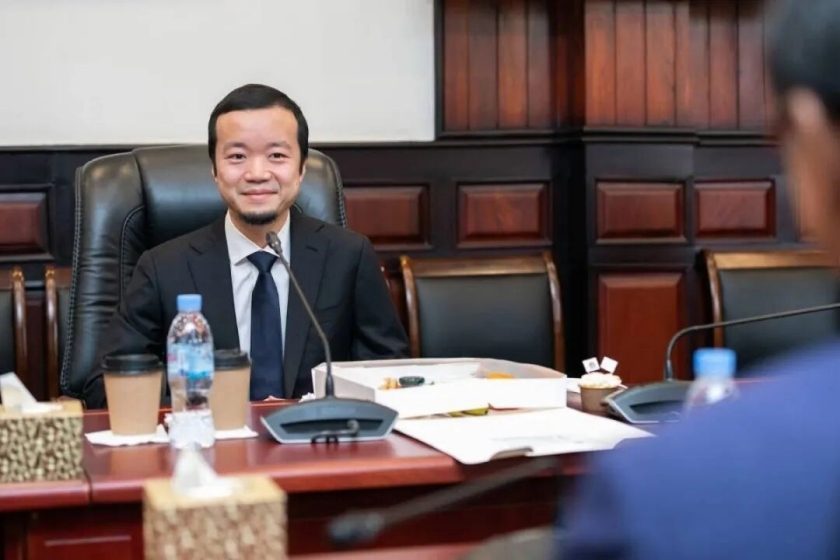In a dramatic turn of events, the Singapore authorities have seized over S$150 million (around $106 million) in assets associated with Chen Zhi, the Chinese-born chairman of Cambodia’s Prince Holding Group. This enforcement operation, executed on October 30, has sent shockwaves through the cryptocurrency community and beyond, as it sheds light on one of Asia’s most intricate transnational fraud networks.
This significant crackdown is part of a larger international law enforcement initiative aimed at dismantling criminal operations linked to fraud in the cryptocurrency space. Earlier this month, U.S. and UK authorities took decisive action by indicting Chen and moving to confiscate approximately $14.4 billion worth of Bitcoin believed to be tied to his expansive scamming network.

Chen Zhi. | Source: Caixin
So, what exactly has led to this sweeping action? Chen founded the Prince Holding Group in 2015, establishing a diverse portfolio that spans real estate, finance, and hospitality across more than 30 countries. However, federal prosecutors now contend that what began as a legitimate business has morphed into a sophisticated criminal enterprise. This network allegedly tricked thousands of individuals into coming to Cambodia under the guise of employment, only to find themselves confined in guarded compounds, where they were forced to participate in “pig butchering” scams. These scams involve grooming victims for long-term deception and manipulating them into investing in fraudulent cryptocurrency trading platforms.
Court documents from the United States paint a bleak picture: the criminal network used over 100 shell companies to launder stolen funds, channeling money through various crypto exchanges and mining operations before ultimately converting it into Bitcoin. According to reports, between May 2021 and August 2022 alone, investigators traced an astounding $18 million back to over 250 victims in the U.S. from operations based in Brooklyn and Queens. This is merely a fraction of the total sums funneled back to Cambodia. In light of these findings, the U.S. Treasury’s Office of Foreign Assets Control sanctioned 146 individuals and entities connected to the Prince Group, underscoring the ambitious aims of this operation.
🚨 @USTreasury has moved to make its largest-ever cryptocurrency seizure, targeting $12B in #Bitcoin from a global “pig butchering” scam. #US #PigButchering
https://t.co/6JpciJNrod— Cryptonews.com (@cryptonews) October 14, 2025
The effort to curtail this fraud extends beyond the U.S. The UK has joined the fray, imposing sanctions on Chen and several affiliates of the Prince Holding Group, marking a collaborative international response to what is becoming an increasingly pressing issue of financial security in the crypto realm.
A curious twist in this narrative emerged just a day after the Department of Justice’s announcement regarding the indictments. A wallet associated with the Chinese mining pool LuBian, previously linked to Chen, stirred intrigue by transferring 11,886 BTC, valued at around $1.3 billion, after lying dormant for over three years. This sudden movement was followed by another batch of 15,959 BTC, equivalent to $1.83 billion, dispersed across several addresses, prompting speculation if these were precautionary measures or part of a greater strategy.
‼️ LuBian-linked wallets move 15,959 BTC worth $1.83B, marking the second transfer in two weeks after the Oct 15 movement of 11,886 BTC worth $1.3B following the DOJ case.#Bitcoin #Lubian #DOJ
https://t.co/SLHs8g9uJF— Cryptonews.com (@cryptonews) October 22, 2025
LuBian, once heralded as the sixth-largest mining pool in the world for its promise of secure investments, met a tragic downfall in December 2020 when more than 90% of its holdings were lost. U.S. prosecutors argue that Chen and his cohorts laundered illicit profits through extensive mining operations, including Warp Data in Laos and LuBian, positioning these operations as sources of “clean Bitcoin” dissociated from criminal activities.
If the DOJ’s forfeiture efforts succeed, we could witness one of the most significant augmentations to the U.S. government’s Bitcoin reserves, which Treasury Secretary Scott Bessent estimates to range between $15 billion and $20 billion as of August. This evolving narrative reminds us of the ever-shifting landscape within the cryptocurrency realm, where fortunes can fade or flourish at a moment’s notice.
As this story unfolds, it raises profound questions about the future of cryptocurrency regulation and enforcement. How will global coalitions adapt to combat these sophisticated financial crimes? What frameworks will emerge to protect investors in the face of such organized deceit? The answers remain uncertain, but one thing is clear: the fight against cryptocurrency fraud is far from over.
Stay tuned for ongoing updates and insights on this developing story, as the implications for both the cryptocurrency market and regulatory practices could be monumental.
